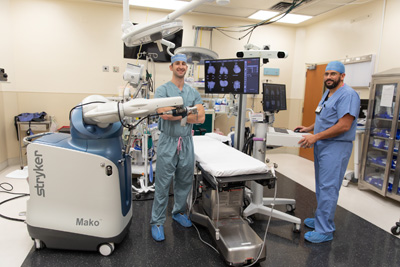
If you or a loved one are considering a hip or knee replacement procedure, you might want to look into one that uses a Mako.
This particular Mako is not one of the swift-swimming, short-finned sharks that thrive here in Florida’s tropical waters, or the popular auto paint and repair franchise with a similar name. Instead, it is a component of medical device manufacturer Stryker’s robotic-arm-assisted technology platform for joint replacements.
Just ask Vero Orthopaedics’ Dr. Jason Stack, a newly arrived fellowship-trained joint replacement expert.
He is clearly a fan of this medical Mako.
And so is the Tufts University Medical School.
It says “the Mako technology provides patient-specific 3-D models to pre-plan hip and knee replacements. During surgery, surgeons guide the Stryker robotic-arm based on your patient-specific plan. This helps the surgeon to focus on removal of diseased bone, helping preserve healthy bone and assists in properly positioning the replacement joint based on [the patient’s individual] anatomy.”
Stryker’s Mako starts with a CT scan of joint to be replaced. A 3-D virtual model of the patient’s unique anatomy is generated from the results of the scan and loaded into the system’s software to create a personalized pre-operative plan.
During the actual joint replacement procedure, the surgeon guides the robotic arm while positioning the prosthetic implant based on that patient’s pre-operative plan.
The Mako system also allows Stack and other surgeons to make adjustments to that plan during surgery if needed.
In other words, the robot isn’t doing the surgery. Stack is.
“It’s not an autonomous robot,” Stack explains. “It’s what we call a haptic robot that locks into the plane that you want to cut at due to the pre-operative plan. And then it creates boundaries so you stay within those boundaries and you don’t risk cutting the important structures around the knee like the ligaments and other vital structures,” but it’s the surgeon and not the robot who makes the decisions.
When Stack prepares the damaged bone for the implant, the Mako system helps provide more accurate placement and alignment of the prosthetic implant and, he says, that results in better outcomes for patients.
“A well-balanced knee [or hip] really increases the longevity of any joint replacement,” says Stack, “and a less than ideal placement of components in joint replacement can lead to pain and instability” for the patient.
Certainly, the National Institutes of Health is onboard with these robotic-assisted procedures. It says “with surgery increasingly using technology and instruments adapted from mechanical industry, it is logical to expand the role of robots to surgery.”
Moreover, says NIH, “the presence of nerves, blood vessels and other soft tissue structures in the vicinity [of the surgery], along with natural anatomical variations necessitates in many instances the desire for human guidance and robots to help to make the surgery both accurate and safe.”
And then there’s cutting precision. According to Stack, the Mako 3.0 allows him to make very exact bone cuts that help with “your ligament balancing and the implant positioning.”
Clearly enthused he adds, “I think this is definitely an exciting time for someone who needs a joint replacement due to the technology that’s now available.”
And, quite frankly, that’s a huge universe of patients that soon will be even larger.
Just five years ago, approximately 680,000 Americans had knee replacements while another 370,000 had total hip replacements annually, but those numbers are about to skyrocket.
In the coming decade, NIH projects the demand for knee replacements will hit 3.4 million a year while hip replacements will soar to 570,000 annually.
A conversation with Stack might help you decide if there should be a Mako in your future.
Dr. Jason Stack is an orthopedic surgeon with Vero Orthopaedics & Neurology at 1155 35th Lane, Suite 100 in Vero Beach. The phone number is 772-569-2330.



